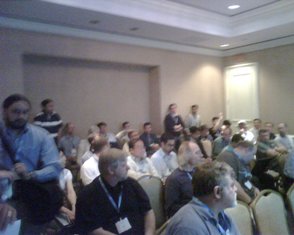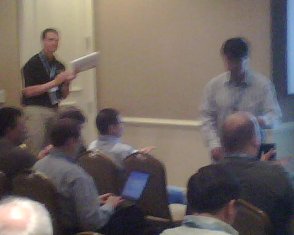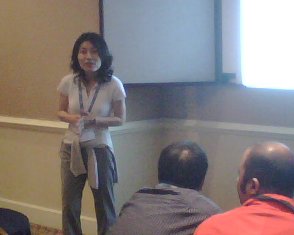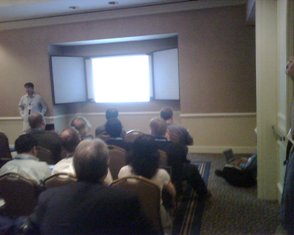MTAAP'07
Workshop
on Multithreaded
Architectures and Applications
Held in
Conjunction with the
International
Parallel and
Distributed Processing Symposium (IPDPS 2007)

Long Beach, California, March 30, 2007
|
|
|
|
|
Workshop Organization
Chairs
Luiz DeRose (Cray)
Jarek Nieplocha (PNNL)Program Committee
David Bader (Georgia Tech)
Frank Baetke
(HP)
Calin Cascaval (IBM)
Barbara Chapman (U. Houston)
John Feo (Cray)
Guang Gao (U. Delaware)
Bruce Hendrickson (Sandia National Laboratory)
Andres Marquez (Pacific Northwest National Laboratory)
Michael Merrill (DoD)
Jose Moreira (IBM)
Walid Najjar (U. California
Riverside)
Fabrizio Petrini (Pacific
Northwest National Laboratory)
Josep Torellas (University
of Illinois)
Mateo Valero (Universitat
Politècnica
de Catalunya)
Jeff Vetter (Oak Ridge National Laboratory, Georgia Tech)
Theme
Multithreading (MT)
programming and execution
models are starting to permeate the high-end and mainstream computing
scene.
This trend is driven by the need to increase processor utilization and
deal
with the memory-processor speed gap. Recent and upcoming examples
architectures
that fit this profileare
Cray's Eldorado,
IBM Cyclops, and several SMT processors from Sun (UltraSparc
T1), IBM (Power5+, Power6), Intel (Xeon with hyperthreading).
The underlying rationale to increase processor utilization is a varying
mix of new
metrics that take performance improvements as well as better power and
cost
budgeting into account. Yet, it remains a challenge to identify and
productively program applications for these architectures with a
resulting
substantial performance improvement. This workshop intends to identify
applications that are amenable to MT and the MT programming and
execution
models as well as the underlying architectures on which they can
thrive. The
workshop seeks to explore programming frameworks in the form of MT
languages
and libraries, compilers, analysis and debugging tools to increase the
programming productivity.
Topics of Interest
Topics of interest
are guided by their application
impact and include but are not limited to following topics:
- Multithreaded Performance
Metrics and Evaluations
- Multithreaded
Architectures
- Multithreaded
Programming Framework
- Innovative
Applications for MT architectures
- Compilation
and Optimization for MT architectures
- Multithreaded Libraries
and Runtime Systems
- Multithreaded Performance
Analysis and Debugging Tools
Results of both
theoretical and practical
significance will be considered.
Program
I. 8:30-8:45am: Welcome MessageII. 8:45-9:45am: Keynote Talk - Michael Merrill, DoD
III. 9:45-11:00: Architectures. Sesion chair: Scott Pakin (Los Alamos)
- Sheng Li (U. Notre Dame), Amit Kashyap (U. Notre Dame), Shannon Kuntz (U. Notre Dame), Jay Brockman (U. Notre Dame), Peter Kogge (U. Notre Dame), Paul Springer (NASA), Gary Block (NASA), A Heterogenous Lightweight Multithreaded Architecture
- Ge Gan (U. Delaware), Ziang Hu (U. Delaware), Juan del Cuvillo (U. Delaware), Guang Gao (U. Delaware), Exploring a Multithreaded Methodology to Implement a Network Communication Protocol on the Cyclops-64 Multithreaded Architecture
- Shigeru Kusakabe, Satoshi Yamada, Mitsuhiro Aono, Masaaki Izumi, Yoshinari Nomura, Hideo Taniguchi, Makoto Amamiya, OS Mechanism for Continuation-based Fine-grained Threads on Dedicated and Commodity Processors
11:00-11:15 Break
IV. 11:15-12:30 Programming Models and Performance. Sesion chair: Martin Schultz (LLNL)
- David Bader (GaTech), Varun Kanade (GaTech), Kamesh Madduri (GaTech), SWARM: A Parallel Programming Framework for Multi-Core Processors
- Weirong Zhu (U. Delaware), Ziang Hu (U. Delaware), Guang Gao (U. Delaware), On the Role of Deterministic Fine-Grain Data Synchronization for Scientific Applications: A Revisit in the Emerging Many-Core Era
- Michel Dubois (USC), Hyunyoung Lee (U. Denver), Lan Lin (USC), STAMP: A Universal Algorithmic Model for Next-Generation Multithreaded Machines and Systems
12:30-2:00pm Lunch
V. 2:00-3:15pm Algorithms. Sesion chair: David Bader (Georgia Tech)
- Jonathan W. Berry (Sandia), Bruce Hendrickson (Sandia), Simon Kahan (Cray), Petr Konecny (Cray), Software and Algorithms for Graph Queries on Multithreaded Architectures
- Keith Underwood (Sandia), Megan Vance (Sandia), Jonathan Berry (Sandia), Bruce Hendrickson (Sandia), Analyzing the Scalability of Graph Algorithms on Eldorado
- Joseph Crobak (Rutgers), Jonathan Berry (Sandia), Kamesh Madduri (GaTech), David Bader (GaTech), Advanced Shortest Path Algorithms on a Massively-Multithreaded Architecture
3:15-3:45pm: Break
VI. 3:45-5:00pm: Applications. Sesion chair: Keith Underwood (Sandia)
- Ryan Grant (Queen's U.), Ahmad Afsahi (Queen's U.), A Comprehensive Analysis of Multithreaded OpenMP Applications on Dual-Core Intel Xeon SMPs
- Ranjit Noronha (Ohio State), Dhabaleswar Panda (Ohio State), Improving Scalability of OpenMP Applications on MultiCore Systems Using Large Page Support
- Chad Scherrer (PNNL), Nathaniel Beagley (PNNL), Jarek Nieplocha (PNNL), Andres Marquez (PNNL), John Feo (Cray) and Daniel Chavarria (PNNL), Probability Convergence in a Multithreaded Counting Application
Proceedings
The proceedings of this workshop have been published together with the proceedings of other IPDPS 2007 workshops by the IEEE Computer Society Press.
Paper Submissions (Closed)
Submitted manuscripts
may not exceed 20
single-spaced pages using a 12-point font on
8½×11-inch pages,
everything included (figures, tables, references, etc.). Manuscripts
must be
submitted electronically and in either PostScript or PDF format.
Submissions
will be judged on correctness, originality, technical strength, significance, quality of
presentation, and interest and
relevance to the workshop attendees. Submitted papers may not have
appeared in
or be under consideration for another workshop, conference, or journal.
MTAAP submissions are
being handled by EDAS system.
To submit a paper, please use the
following link https://edas.info/newPaper.php?c=5033&submit=0&
and follow the instructions.
Important Dates
|
Papers due: |
23
December 2006 |
|
PC reviews due: |
7
January 2007 |
|
Notification of acceptance: |
10
January 2007 |
|
Camera-ready due: |
22
January 2007 |
Additional Information
E-mail Contact
For more information
on MTAAP 2007 or if you have
any questions please contact the workshop organizers at the e-mail
address
listed at the bottom of this page.



